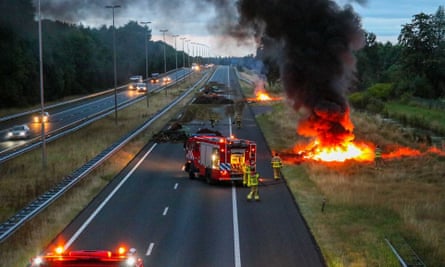What is the reason behind the protests by Europe’s farmers, and why is the far right paying attention?
T
The lines of farm vehicles that have obstructed roads in Germany, leading to disruptions in cities and causing problems for people commuting, are the most recent manifestation of increasing frustration towards measures aimed at preserving Europe’s environment from the harmful emissions produced by its farms.
In the past few years, agricultural workers in western Europe have fiercely opposed policies aimed at protecting the environment, claiming that they are too costly. The Netherlands has experienced the strongest backlash, with a court ruling on nitrogen emissions in 2019 sparking ongoing and passionate protests against government measures to shut down farms and reduce the amount of livestock on them. Belgium has also seen similar battles, resulting in convoys of tractors blocking the EU district of Brussels in March of last year. In Ireland, where protests have been smaller, dairy farmers frustrated with nitrogen regulations marched with their cows to the offices of three government officials last month.
Both Spain and France have been affected. In January 2023, farmers in Madrid protested against the government’s decision to limit their use of water from the Tagus river, which was experiencing a severe drought after Spain’s hottest year on record. The next month, French farmers also took action by driving tractors through Paris to demonstrate against a pesticide ban.
The battle has now reached the largest economy in Europe. In response to farmers protesting in Berlin by dumping manure on the streets last December, the German government has weakened its proposal to reduce subsidies for diesel use in farming vehicles. However, lobbying groups are pressuring them to completely abandon the plan. Joachim Rukwied, leader of the German farmers’ association, stated on Monday that 100,000 tractors had participated in a week of disruptive protests. He also declared that “farmers have sent a strong message to the federal government to completely retract the proposed tax hikes.”

For certain farmers, the responsibility of shouldering additional costs for their pollution is seen as going too far, especially after facing an energy crisis and pandemic that has caused financial difficulties. Many feel overwhelmed by regulations and unappreciated by urban residents who consume their crops without understanding their origins. In major agricultural countries such as the Netherlands and France, farmers have voiced their dissatisfaction with government demands to decrease production, despite previous encouragement to increase output.
Activists focused on protecting the environment express their opposition to reducing subsidies for farmers. Instead, they advocate for redirecting these funds towards more sustainable practices. Sascha Müller-Kraenner, the leader of Environmental Action Germany, urges for agricultural subsidies to be tied to ecological and social criteria. He emphasizes the need for a subsidy policy that maximizes farm income, addresses climate change, and preserves nature without increasing the budget. Furthermore, he stresses the importance of phasing out subsidies that have a negative impact on the climate.
Researchers have highlighted the potential harm to agricultural lands caused by rising levels of pollution, which will result in a less favorable climate for human habitation. The European Commission reports that over 80% of habitats in Europe are currently in a deteriorating state, and some crops are already experiencing decreased yields due to issues such as depleted soil, water scarcity, and more frequent and severe extreme weather events.
However, certain European governments are more concerned about the potential impact of farmers’ demonstrations on far-right and populist parties, as well as radical conspiracy theorists.
In the Netherlands, the issue of nitrogen has resulted in the formation of the Farmer-Citizen Movement, a political party representing rural communities. This party saw significant success in provincial elections in March, but placed sixth in the general elections in November. In Germany, the protests have received backing from the far-right Alternative for Germany (AfD) as well as other groups with extreme and anti-democratic ideologies. On Monday, Robert Habeck, the Minister of Climate and Economy, expressed concern about fringe groups taking advantage of the protests. He stated, “There are circulating calls promoting coup fantasies, extremist groups are emerging, and symbols of ethnic nationalism are being openly displayed.”
The demonstrations have brought attention to a divide within Europe’s moderate conservative factions. During a session in the European parliament in the previous year, the centre-right European People’s Party (EPP) spearheaded a coalition of conservative lawmakers who almost succeeded in rejecting a bill aimed at reviving nature because it was believed to negatively impact farmers. This proposal is a crucial aspect of the European Green Deal, which is being championed by the president of the European Commission and prominent EPP member, Ursula von der Leyen, and was previously supported by the centre-right group.
The farmers’ protests have received support from the grassroots level, seen through various forms such as campaign signs and Telegram groups. However, this support has also been accompanied by conspiracy theories related to Covid, climate change, and migration.
According to Léonie de Jonge, a political scientist at the University of Groningen specializing in the far right, the Netherlands served as a precursor for these protests, showcasing the emergence of a new form of agrarian populism in various countries.
Skip over the promotion for the newsletter.
after newsletter promotion
The idea of conspiracies has extended from countryside farms in northern Europe to television programs in the United States and social media platforms worldwide. Recently, Dutch commentator Eva Vlaardingerbroek joined German farmers on a tractor to express anger towards “global elites” who are allegedly targeting the labor of those who provide food for us.
Last year, Vlaardingerbroek expressed a widely spread idea in an interview with Tucker Carlson from Fox News. She suggested that organizations such as the World Economic Forum are attempting to force Dutch citizens to consume bugs by restricting farms and establishing insect factories. This video on YouTube, titled “Politicians understand that controlling food means controlling people: Activist,” has been watched over 500,000 times. Vlaardingerbroek stated, “We do not desire to eat insects; we prefer our steak.”
Conspiracy theorists with significant followings have also made similar statements. In a recent post on X, Vlaardingerbroek referred to farmers as one of the few groups with the strength to resist the globalists seeking to completely alter our way of living. Elon Musk, a billionaire and owner of the platform, has previously expressed support for anti-Semitic conspiracy theories and responded to Vlaardingerbroek’s post by saying “I stand with the farmers!”
The German agricultural organization has separated itself from extremist organizations that have attempted to sway their demonstrations. Certain farmers displayed signs on their tractors during the protests with the message “Farming is diverse, not associated with fascism” as a nod to the brown attire of these groups. In addition, some were photographed with makeshift gallows featuring a traffic light – symbolizing the political parties of the governing coalition, which use the colors red, yellow, and green.
According to De Jonge, the problems faced by farmers can lead to far-right beliefs due to a longing for the past and the promotion of “blood and soil” ideas. He also noted that there has been a mixing of various forms of extremism among certain individuals involved in the protests in Germany and the Netherlands.
She stated that ideologies used to have distinct boundaries, but now they incorporate concepts from various ideologies and incorporate them into their overall perspective.
Source: theguardian.com



